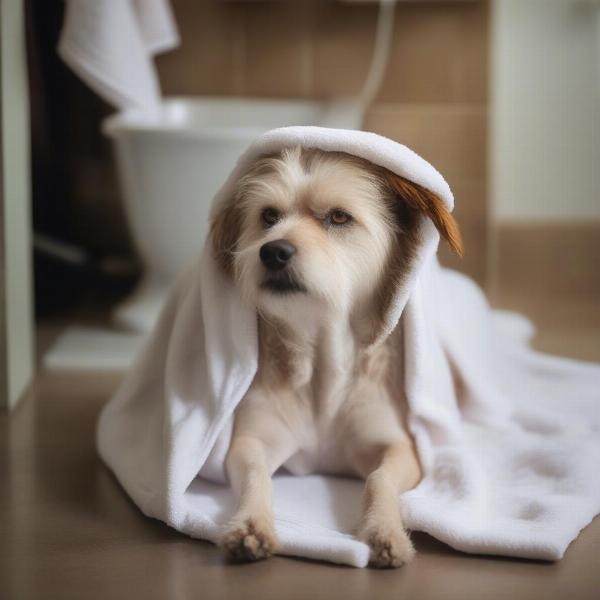Finding the right dog shampoo for smell can be a challenge. With so many options available, it’s hard to know which one will effectively eliminate odors and leave your dog smelling fresh and clean. This guide will explore the causes of dog odor, different types of shampoos designed to tackle those smells, and tips for choosing the best one for your furry companion.
Understanding the Causes of Dog Odor
Before diving into the world of dog shampoos, it’s important to understand why dogs can develop unpleasant odors. While some dog breeds naturally have a stronger scent than others, several factors can contribute to excessive or unusual smells:
- Skin infections: Yeast or bacterial infections can create a musty or yeasty odor.
- Allergies: Environmental or food allergies can cause skin inflammation and itching, leading to excessive licking and a subsequent sour smell.
- Rolled in something stinky: Let’s face it, dogs love to roll in things they shouldn’t! From dead animals to garbage, these adventures can leave them with a lingering stench.
- Poor hygiene: Infrequent bathing or improper grooming can lead to a buildup of dirt, oil, and bacteria, resulting in a less-than-pleasant aroma.
- Anal gland issues: Impacted or infected anal glands can emit a particularly foul odor.
Choosing the Right Dog Shampoo for Smell
Once you’ve identified the potential cause of your dog’s odor, you can start searching for the perfect shampoo. Here are some key factors to consider:
Targeting Specific Odors
- Deodorizing shampoos: These shampoos are formulated to neutralize odors and leave your dog smelling fresh. They often contain ingredients like baking soda or activated charcoal.
- Medicated shampoos: For dogs with skin infections or allergies, medicated shampoos containing antifungal or antibacterial agents can help address the underlying cause of the odor.
- Oatmeal shampoos: Soothing and moisturizing, oatmeal shampoos are ideal for dogs with sensitive or itchy skin. They can help alleviate irritation and reduce the urge to lick, which can contribute to odor.
Ingredients to Look For and Avoid
- Natural ingredients: Look for shampoos with natural ingredients like essential oils, aloe vera, and chamomile, which are gentle on the skin.
- Avoid harsh chemicals: Steer clear of shampoos containing sulfates, parabens, and artificial fragrances, as these can irritate your dog’s skin and strip away its natural oils.
- Hypoallergenic formulas: If your dog has sensitive skin, opt for a hypoallergenic shampoo that is free of common allergens.
Bathing Your Dog: Tips and Tricks
Choosing the right shampoo is only half the battle. Proper bathing technique is essential for effectively eliminating odors and keeping your dog’s coat healthy and clean.
- Wet your dog thoroughly: Ensure your dog’s fur is completely saturated before applying shampoo.
- Lather and massage: Gently massage the shampoo into your dog’s coat, paying attention to areas prone to odor, like the underarms and groin.
- Rinse thoroughly: Rinse all traces of shampoo from your dog’s fur, as residue can irritate the skin and attract dirt.
- Dry completely: Towel dry your dog and, if possible, use a hairdryer on a low setting to prevent dampness, which can lead to odor.
 Dog Being Dried with a Towel
Dog Being Dried with a Towel
Conclusion
Choosing the right dog shampoo for smell requires understanding the cause of the odor and selecting a product that addresses the underlying issue. By following these tips and using proper bathing techniques, you can keep your furry friend smelling fresh and clean. Remember to consult with your veterinarian if your dog’s odor persists or is accompanied by other symptoms, like itching or hair loss.
FAQ
- How often should I bathe my dog? Generally, bathing your dog every 4-8 weeks is sufficient. However, this can vary depending on breed, lifestyle, and skin condition.
- Can I use human shampoo on my dog? No, human shampoo is formulated for human skin and hair and can disrupt the pH balance of your dog’s skin, leading to dryness and irritation.
- What if my dog has sensitive skin? Choose a hypoallergenic shampoo formulated for sensitive skin. Look for natural ingredients and avoid harsh chemicals.
- My dog still smells after using a deodorizing shampoo. What should I do? Consult your veterinarian. The odor may be due to an underlying medical condition requiring treatment.
- Can I use essential oils directly on my dog? No, some essential oils can be toxic to dogs. Always dilute essential oils appropriately and consult with your veterinarian before using them on your pet.
- What are the signs of impacted anal glands? Scooting, excessive licking of the anal area, and a foul fishy odor are common signs of impacted anal glands.
- How can I prevent my dog from rolling in smelly things? Training and positive reinforcement can help discourage this behavior. Keep your dog on a leash in areas with potential “stinky” temptations.
Related Articles
About ILM Dog
ILM Dog is your trusted international resource for expert advice on all aspects of dog care and ownership, from choosing the right breed to senior dog care, health, training, nutrition, and grooming. We offer comprehensive guides and resources to help dog owners worldwide provide the best possible care for their furry companions. Whether you’re a first-time dog owner or a seasoned expert, ILM Dog provides valuable insights and practical tips. Contact us today for expert advice: Email: [email protected], Phone: +44 20-3965-8624.